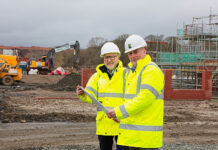
THE recent demise of Muirfield Contracts felt like a throwback to the darkest days of the recession when reports of contractors going out of business were a regular occurrence.
Fortunately, the industry is now on the road to recovery but as this case highlighted, some firms are still experiencing major issues.
Andy Drane, Construction Partner with Edinburgh-based law firm Davidson Chalmers, part of the Globalaw network, believes that while there are plenty of major contractors capable of delivering lucrative large-scale projects, a gap has emerged in the next tier of firms.
He explained, “There is no shortage of large practices geared up for big ticket projects. The sector in Scotland has been dominated by some of these large-scale projects in recent years such as the Commonwealth Games, the Forth Crossing and the dualling of the A9.
“However when it comes to firms capable of delivering the next level of projects, there are significantly less contractors than there was once. A number of these companies disappeared or retrenched during the recession and there’s now a gap.”
Andy believes the picture for the construction sector generally is now looking a lot brighter, and that private sector projects have increased significantly since the uncertainty surrounding Scottish independence ended last September.
“The recession provided a challenging environment for everybody,” he said. “Activity was limited for a while and we were constantly hearing stories about contractors going bust.
“The industry has started to come back now. I was involved recently with a 300-unit housing site in the north east of Scotland. Two years ago there was none of that to speak of.
“I spoke to a scaffolding contractor last week who said he could be letting his kit out three or four times.
“In late July/August last year, people started paying attention to the Independence Referendum and wondering what was coming over the horizon.
“A lot of businesses didn’t make decisions until post-September once they found out what was happening.”
To an extent, that uncertainty is here again with the looming General Election. Speaking to Andy before the various party manifestos had been announced, he suggested the unpredictable nature of the outcome isn’t ideal for business.
“Once the focus switches to the details of the manifestos, the business community will start to think about the ramifications,” he said.
“There must come a point where firms wake up to the fact a coalition government is highly likely.
“Any uncertainty in business is a depressant when it comes to investment. Businesses need to know things like what the tax rate is going to be.
“There are also general issues around different parties. For example, the Tories have said there will be no more subsidies for wind power in England while the parties in the Scottish Parliament have been broadly supportive of wind farms, so there may be opportunities there.”
The lower oil price is also having an impact on the Scottish construction sector, with Aberdeen particularly affected.
“Traditionally when the rest of the economy is doing badly, Aberdeen tends to do well,” Andy added.
“During the recession, many of the biggest value buildings, large scale investments and new offices were in Aberdeen. Visiting the city in 2012/13/14 there was a real feeling of affluence. There were a number of tower cranes, which is always a sign of activity.
“It feels less so now. If the oil price isn’t fixed, I would expect that to worsen.”








